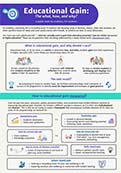
Educational Gain Literature Summary
Publication date: 01 Aug 2023
This literature review aims to synthesise existing research on educational gain in higher education, providing insights into its measurement, determinants and potential implications. The concept of gains includes research on learning outcomes, student outcomes, assessment of outcomes, academic progress, gains and learning gain. This literature review is an output from a Collaborative Enhancement Project supported and funded by QAA Membership and was led by Imperial College London.
| Author: | QAA |
|---|---|
| Format: | |
| Size: | 0.26 MB |

